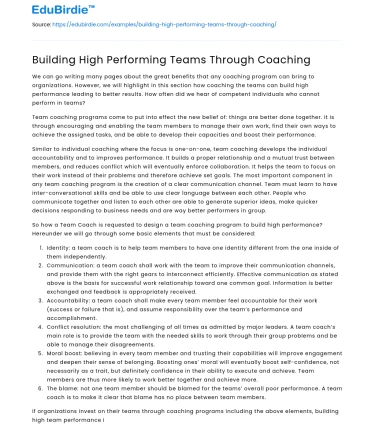We can go writing many pages about the great benefits that any coaching program can bring to organizations. However, we will highlight in this section how coaching the teams can build high performance leading to better results. How often did we hear of competent individuals who cannot perform in teams?
Team coaching programs come to put into effect the new belief of: things are better done together. It is through encouraging and enabling the team members to manage their own work, find their own ways to achieve the assigned tasks, and be able to develop their capacities and boost their performance.
Save your time!
We can take care of your essay
- Proper editing and formatting
- Free revision, title page, and bibliography
- Flexible prices and money-back guarantee
Similar to individual coaching where the focus is one-on-one, team coaching develops the individual accountability and to improves performance. It builds a proper relationship and a mutual trust between members, and reduces conflict which will eventually enforce collaboration. It helps the team to focus on their work instead of their problems and therefore achieve set goals. The most important component in any team coaching program is the creation of a clear communication channel. Team must learn to have inter-conversational skills and be able to use clear language between each other. People who communicate together and listen to each other are able to generate superior ideas, make quicker decisions responding to business needs and are way better performers in group.
So how a Team Coach is requested to design a team coaching program to build high performance? Hereunder we will go through some basic elements that must be considered:
- Identity: a team coach is to help team members to have one identity different from the one inside of them independently.
- Communication: a team coach shall work with the team to improve their communication channels, and provide them with the right gears to interconnect efficiently. Effective communication as stated above is the basis for successful work relationship toward one common goal. Information is better exchanged and feedback is appropriately received.
- Accountability: a team coach shall make every team member feel accountable for their work (success or failure that is), and assume responsibility over the team’s performance and accomplishment.
- Conflict resolution: the most challenging of all times as admitted by major leaders. A team coach’s main role is to provide the team with the needed skills to work through their group problems and be able to manage their disagreements.
- Moral boost: believing in every team member and trusting their capabilities will improve engagement and deepen their sense of belonging. Boosting ones’ moral will eventually boost self-confidence, not necessarily as a trait, but definitely confidence in their ability to execute and achieve. Team members are thus more likely to work better together and achieve more.
- The blame: not one team member should be blamed for the teams’ overall poor performance. A team coach is to make it clear that blame has no place between team members.
If organizations invest on their teams through coaching programs including the above elements, building high team performance is then inevitable. Though it is very difficult today to find people homogeneously working together due to many factors such different mindsets, complexity and business challenges, coaching programs put into effect team togetherness toward achieving common goals.
Team coach’s fundamental role is then to:
- raise awareness by increasing team understanding on how to perform together
- enable the team to gain clarity, understand and commit to the goals
- develop with the team members problem-solving techniques through effective two-way communication including feedback and interface
- develop the team to be able to make the right decision at the right time through selecting convenient course of actions
- release the potential and capabilities of team members and sometimes develop individual personal awareness and improve knowledge and skills
- pay attention to enhance team performance internally and externally, have safe space between them and build trust
- prepare them to handle change and overcome obstacles
- motivate the team and create a long term learning process so that members learn to self-coach
To achieve highly productive team, “the team coach must support the team to define what high performance means for them and how that performance will support the organizations’ need.”
On the other hand, it is worth mentioning as well that a wide-ranging factors have impact on performance. And this is where the role of a great coach emanates. “Also a range of psychological factors have also been highlighted to have impact upon team performance, including role clarity, leadership approach, cohesion, and team emotion” wrote the famous leadership and performance psychologist and researcher Stewart T. Cortelli.






 Stuck on your essay?
Stuck on your essay?

